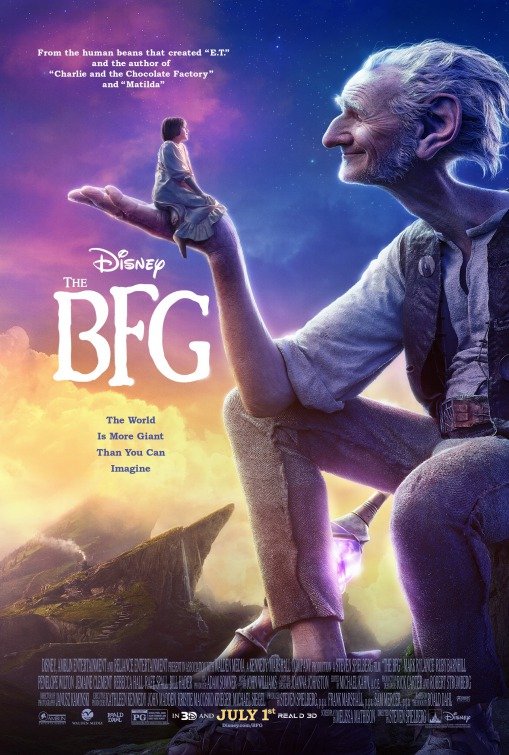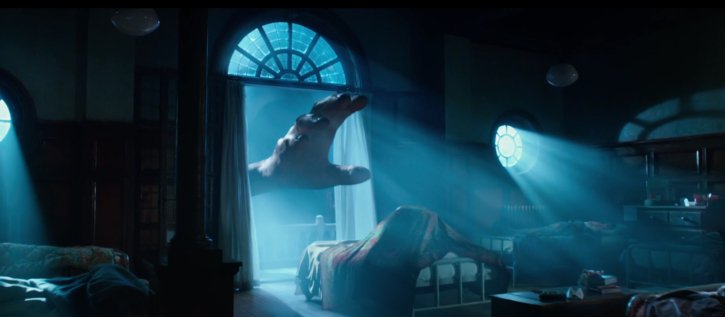Film Review | The BFG Whizzpops with a Lot of Hot Air
There’s something to be said about adaptations revealing more about a director’s unmistakable print than original works. If anything, it’s adapted films that give the most credence to the auteur theory, because if the authorship of a filmmaker can come through while reinterpreting another’s work, then it can come through anything. Steven Spielberg, surely Hollywood’s most agreeable auteur, has an interesting relationship with his more famous adaptations in that it’s not always material that you’d think he’d be eager to sink his teeth into. Often, and quite surprisingly, they can be works made by artists who are generally more fixated with the grim realities of life, and who whose worldviews might be at odds with this director’s trademark, popcorn romanticism.

Perhaps it’s the challenge Spielberg enjoys, in trying to make his mark on something that seems beyond his sentimental scope. Just look at his rather decent, tender hearted take on J.G Ballard’s war memoir Empire of the Sun or – even if it’s not strictly an adaptation – his fascinating if flawed attempt to finally realise his late friend Stanley Kubrick’s AI project. With regards to children’s literature, you’d think this classical storyteller would be on safer ground, considering he’s a master of fantasy and there probably isn’t a better director of young actors around. The genre behemoth that is Roald Dahl is perhaps a pricklier prospect however. While Dahl’s books are brimming with whimsy and surreal silliness, he’s also got a mean streak, as he realises children’s fears like few other writers. See Matilda‘s brutally oppressive authoritarian Ms. Trunchbull or just the fact that troublesome kids are ‘disappeared’ by Willy Wonka.
The BFG, one of Dahl’s most enduring novels, is certainly one of his unapologetically lighter stories, but that doesn’t mean it shies away from giving us carnivorous “bone crunching” giants whose meat is small children. For better and for the worse, Spielberg certainly makes his mark on this film version, by ironing out any of the spikier edges of the source material and giving us a suitably pleasant, if underwhelming experience. To put it simply, this is Spielberg ticking the boxes and little else. For many viewers and the younger ones especially, this will probably be enough to tide them over on rainy Sunday afternoon. But this film is like a paddling pool on a hot day, it’s a nice enough sight, but its depth only reaches your ankles and there’s little use for the older crowd.
Those familiar with the novel will already know the story, with this version being mostly faithful to Dahl’s narrative . A young orphan named Sophie (a precocious if uneven Ruby Barnhill) looks out of her window in the middle of the night, and finds a mammoth figure in the middle of the London street. Fearful of his existence becoming known, the eponymous BFG (Big Friendly Giant) snatches Sophie from her bed in the orphanage and takes her back to his otherworldly homeland of Giant country. It’s there that Sophie learns of the giants skill of making dreams for the children of her homeland, but also the dangers that arise from the considerably less welcoming man eaters who also preside there. Eventually there’s a bit where go to the queen for help and that’s pretty much it.

If that speed-run through the events of film feels like an unfairly brisk summation then don’t worry, because it isn’t. There lies all the events of incident in The BFG, a film that’s heavy on plot the same way Inception is light on exposition. The screenplay was written by the late Melissa Mathison, who is most famous for her E.T script. This being yet another tale of a vulnerable child who discovers a supernatural being that ends up supplanting an absentee parental figure, it’s easy to understand what drew her to the story. But that’s where the comparisons to the 1982 family classic will end. Much of the run-time is dedicated to the essentials like jokes about farting, or jokes about the Queen farting, or jokes about the queen’s corgis farting. Its OK though because they’re called “whizzpops” here, so I guess that makes it a bit more highbrow then your standard Sandler outing.
Moments that should register as heart-warming or awe-inspiring mostly come off as drawn out and irksome. Spielberg certainly wants us to be astonished by Sophie and The BFG’s journey in to the dream world but watching the lanky, long limbed and oversized cartoon person fall over himself is all just a bit nauseating. The CG eyesore that is giant country is no doubt an impressive technical feat, but the garish superficiality of it all can undermine any emotional reaction that might be elicited. Every frame just looks like its pissing money, which is made look all the more apparent by the more ridiculous set pieces. One sequence finds Sophie trapped in a car that’s basically acting as roller-skate for one of the more nefarious giants and it’s a mind-numbingly tensionless as it sounds. The problem with computer generated imagery is that you can do anything, but that doesn’t mean you should.
Spielberg’s tropes may be hit and miss here, but there is some magic amongst the madness. Of the few genuinely touching moments, the best one comes when we see The BFG release his concocted dream into a child’s bedroom. Showing some welcomed restraint, Spielberg realises the boy’s call from the US president as shadow puppetry on the wall and it’s an aptly affecting representation of childlike escapism. Mark Rylance, fresh off his much deserved Oscar win for the same director’s Bridge of Spies, also deserves some praise as the titular giant. His Rudolf Abel was a masterclass in understatement but he shows he can also excel in a much bigger performance as this (no pun intended). With his doltish vocabulary and eccentric mannerisms, the BFG could very well been an insufferable creation but Rylance’s motion capture work endears you to him as a kind of older Yorkshire relative you wouldn’t mind visiting.
But Spielberg’s qualities as Hollywood’s greatest populist entertainer were never in doubt. The issue is that he remains in auto pilot throughout, confident that his crowd pleasing touches will guide him to the finish line. It’s those touches that many allow, but most won’t remember long after. Steven Spielberg has made worse films than this, but he’s also certainly made much, much better ones.
The BFG is in cinemas now. Check out the trailer below.
[youtube id=”GZ0Bey4YUGI” align=”center” autoplay=”no” maxwidth=”750"]
Featured Image Credit

